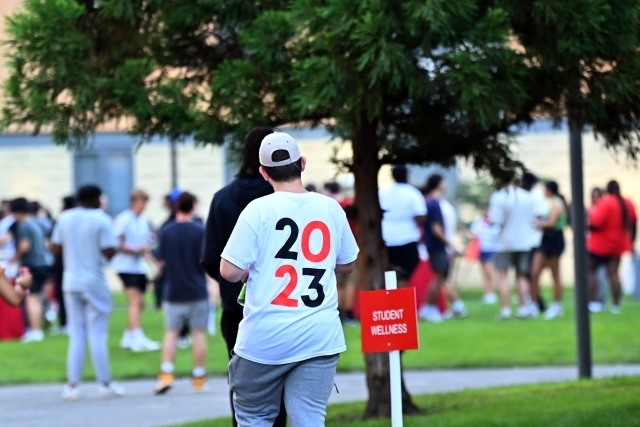
Mindful of the varied challenges faced by college students, the St. John’s University Department of Student Wellness is encouraging students to take advantage of the many resources available to enhance their mental and physical well-being.
Student wellness programs include those offered by the Office of Disability Services, Student Health Services, the Center for Counseling and Consultation, and Campus Recreation. Other resources are available through the department’s Wellness Education and Prevention Services team and its Sexual Violence Outreach, Awareness and Response (SOAR) unit.
Anxiety and trauma-related issues are among those mental-health concerns most in evidence at St. John’s, according to Luis G. Manzo, Ph.D., Assistant Vice President, Student Wellness, Division of Student Success, and a licensed psychologist. A recent National Education Association study identified depression, anxiety, and suicide ideation as significant mental health issues among college students nationwide and noted an increase in the percentage of students who meet the criteria for at least one mental health issue.
“We want our students to utilize the services that are available,” Dr. Manzo said. “Coming to the counseling center, for example, is not a sign of weakness. It’s a sign of strength. We are here to help students get through any difficult experiences.”
The University’s multidimensional approach to student mental health includes the counseling center located in Room 130 of Marillac Hall on the Queens, NY, campus. Free and confidential services are provided in nonjudgmental sessions; virtual sessions are also available. The center’s Mental Health Helpline—718-990-6352—is staffed 24 hours a day.
Likewise, the University sponsors wellness workshops on subjects such as alcohol and drug awareness, time management, stress mitigation, suicide prevention, and more. Wellness Education and Prevention Services offers personalized wellness coaching, mindfulness seminars, and even sessions on effective sleeping.
“The health and well-being of our students is of paramount importance to St. John’s,” said Sarah Jean Kelly, J.D., Vice President for Student Success and Retention Strategy. “We know how critical physical and mental health care are to our student population, and our ability to meet these student needs is instrumental to their ability to thrive here at the University.”
The University’s SOAR program offers workshops on sexual consent and bystander intervention. Confidential support advisers are available by phone at 718-990-8484 or email at [email protected]. The office sponsors sexual violence awareness events each October and April.
Students in need of educational accommodations can secure extended exam time, assistive technology, American Sign Language interpreters, and more through the Office of Disability Services located in Marillac Hall, room 134.
For students impacted by post-traumatic stress disorder (PTSD) and related conditions, Student Wellness last year began an innovative program of trauma-informed yoga that can help students with self-awareness, fear reduction, and muscle tension.
“Participants don’t have to tell us what they experienced,” Dr. Manzo explained. “But they can do this class with instructors specifically trained in the approach. What the literature shows is that it’s another healing possibility for those who have experienced trauma.”
Less common than trauma is homesickness, which is seen most among first-year students, Dr. Manzo said. However, it’s important for homesick students to remember they are not alone.
“It’s very normal to have the experience of homesickness when you’re going through a transition to college,” Dr. Manzo said. “You might feel disengaged, and that can be disorienting. What I recommend to students is to get involved. The more connections you have on campus, the more that buffers feelings of anxiety and stress.”
Establishing those essential connections was more challenging during the worst of the COVID-19 pandemic, said Dr. Manzo, whose office noticed an increase in anxiety across the student population.
But there was also good news: Students seemed more willing to meet with wellness counselors, trusting that discussing their concerns would ease COVID anxiety.
“COVID was a major disruption to individuals’ lives; a lot of social connections, particularly, were disrupted,” Dr. Manzo said. “But we have been seeing an increase in people coming forward, which is welcome.”
Recognizing the link between physical and mental health, Dr. Manzo encourages students to take advantage of Campus Recreation’s two facilities: the Fitness Center in Carnesecca Arena and Taffner Field House. He encourages a program of consistent exercise, even if it is merely a walk around campus. The University maintains two fitness trails; paths measure one mile and 1.5 miles.
Information on proper nutrition is also available from Dr. Manzo’s office. Student Health Services, located in the rear of DaSilva Hall, offers no-cost care of minor injuries and illnesses. Appointments can be made by calling 718-990-6360 or online through the Medicat Patient Portal linked to a student’s St. John’s SignOn.
“It is important to establish a foundation now about the value of therapeutic services, nutrition, avoiding alcohol abuse, and the like,” Dr. Manzo said. “Seeing a doctor regularly and learning what to look for as a health-care consumer can have an impact throughout a student’s entire life.”
